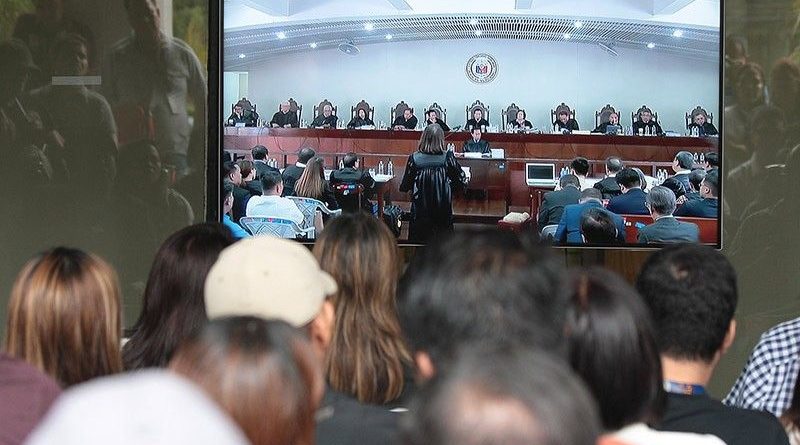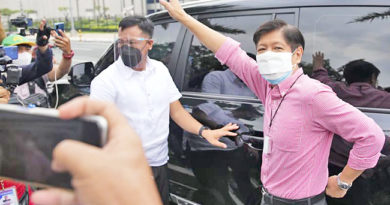DU30 v. CJ SERENO-The SC Oral Arguments: MANILA – Highlights: Oral arguments on Sereno ouster
Spectators at the Supreme Court compound in Baguio City watching a streaming of the oral arguments on the ouster petition against Chief Justice Maria Lourdes Sereno.
.
.
MANILA, Philippines — In a historic first, a sitting chief justice faced her colleagues to defend the qualifications and validity of her appointment.
On April 10, the Supreme Court en banc held almost six hours of oral debates in Baguio City on Solicitor General Jose Calida’s petition for quo warranto against Chief Justice Maria Lourdes Sereno.
A quo warranto, under Rule 66 of the Rules of Court, is a legal action “for the usurpation of a public office, position or franchise.” It may be initiated by a solicitor general or a public office. The petition challenges a public official’s hold over a position.
Presentations during the oral arguments were limited to the issues of jurisdiction, the potential outright dismissal of the petition for filing out of time, the alleged falsehood in connection with the Statements of Assets, Liabilities and Networth filed by Sereno and questions on whether the Judicial and Bar Council acted with grave abuse of discretion, among others.
READ: Five justices refuse to inhibit from ouster petition against Sereno
Here is a run-down of some issues deliberated by the SC justices during the nearly six hours of oral debates
Test of integrity
Calida said Sereno “flunked the test of integrity” when she failed to file the required number of SALNs.
“She was appointed to that position although she was not able to prove that she is a person of proven integrity,” Calida said.
“The constitutional qualification of proven integrity among all judicial officers is not a hollow provision that can be ignored or waived,” the solicitor general added.
Those vying for the chief justice post in 2012 were asked to submit all of their SALNs, according to the JBC.
But it was revealed during the impeachment hearing at the House of Representatives’ justice committee that Sereno only filed three when she applied. A representative from the JBC, however, said in the same House hearing that the council deemed Sereno’s submission of her 1998, 2002 and 2006 SALNs to be in “substantial compliance” with their requirement.
Associate Justice Marvic Leonen during his interpellation said that one’s failure to comply with the SALN requirement does not constitute lack of integrity. He argued that bigger offenses such as theft, graft, corruption or bribery, which the chief justice said she did not commit, could.
“If our measure of integrity is only a piece of paper, then God help us.”
READ: At Sereno ouster hearing, Justice Leonen asks: Can SALN attest to one’s integrity?
SALN issues
Associate Justice Noel Tijam, said to be the ponente of the case, meanwhile, pointed out that the failure to comply with JBC’s SALN requirement was not the only issue. He claimed it was put on record that Sereno admitted to not filing her SALNs. This was, however, countered by Sereno.
“That’s your conclusion, I dispute that,” she said. “You want me to admit that. You want to trap me,” she added.
“The burden is on the petitioner. The issue of the integrity is with the JBC.”
The argument of the two magistrates revolves around the three SALNs filed by Sereno. The chief justice said she was able to file only her SALNs for 1998, 2002 and 2006 as these were the only ones available online for her to download at the time of her application for the position.
She said the absence of her SALNs for the other years does not mean that she failed to file.
Tijam also asserted that “integrity” is not founded on jurisprudence. “It is founded on honesty, probity, truthfulness made by person.”
Sereno answered that when she was included on the JBC’s shortlist for the chief justice position in 2012, she was already deemed by as a candidate with integrity.
More SALN questions
Associate Justice Teresita De Castro’s first question to Sereno was if the chief justice “judiciously” filed her SALNs over the years.
The two justices locked horns for a few minutes, talking over each other as Sereno issued a challenge to her colleagues. She asked if they would also testify under oath if a quo warranto case, grounded on SALN filing, has been lodged against them.
Acting Chief Justice Antonio Carpio had to intervene as the exchange got heated between the two justices.
De Castro asked Sereno why she supposedly filed a false SALN in 2010 and an incomplete one in 2012.
The justice said that Sereno, upon her resignation from the University of the Philippines in 2006, only filed one SALN instead of two: one for 2005 and another during her resignation. She also pointed out that the lone SALN was filed in 2010.
Sereno argued that under the Doblada doctrine, she “consistently filed by SALNs as required by the law.”
The Doblada doctrine was about a case involving a court sheriff who was sued for accumulating properties above his supposed income. The SC ruled that just because his SALNs could no longer be located, it does not mean that he did not file them.
Sereno has earlier said that she has recovered some of her supposed “missing” SALNs.
READ: Sereno maintains compliance with SALN submission requirements
The chief justice said that she would present them to the Senate, which is the proper venue to do so since, they argued, it is the Congress that has jurisdiction over her ouster petition and not the SC.
Sereno case may set precedent
Leonen raised that Sereno’s case might serve as a precedent to future cases. Interpellating Calida, he said: “The court is also concerned about precedence. In the future, it might be [used] to oust a sitting justice based on the doctrines if we allow your case.”
This is an echo of Sereno’s earlier challenge to her colleagues when she was first quizzed by De Castro.
Associate Justice Alfred Benjamin Caguioa, meanwhile, while interpellating Alex Poblador, Sereno’s lead counsel, raised: “If I follow the theory… then whoever is the solicitor general would… have the ability to wield a sword over all our collective heads, over all our individual heads, and on that basis, therefore impair the integrity of the court, as a court.”
“The OSG can latch on to any imputation of any crime involving moral turpitude and on that basis, initiate a quo warranto proceeding against any justice and have him removed,” Caguioa said.
Poblador agreed and said that the mere act of filing a quo warranto “would destroy the independence” of the SC.
“Arguably, you can make a case against any sitting justice which to me highlights the danger of allowing [this petition],” Poblador added.
Sereno’s camp has repeatedly said that the only legal course to oust her from the position is through an impeachment process that is vested upon the Congress.
The parties were ordered by the SC to file their respective memorandum on or before April 20.
READ: After hours-long grilling session, Sereno says fight continues
Kristine Joy Patag (philstar.com) – April 13, 2018 – 2:06pm | All photographs, news, editorials, opinions, information, data, others have been taken from the Internet ..aseanews.net | [email protected] | For comments, Email to : aseanews.net |









